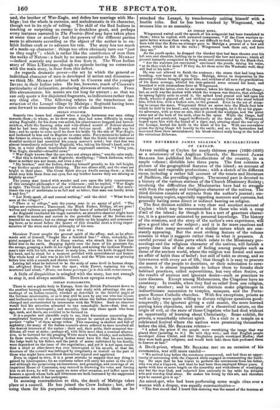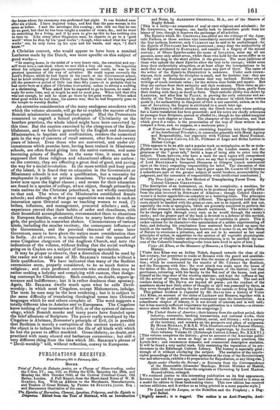THE REVEREND JAMES SELKIRK'S RECOLLECTIONS OF CEYLON.
AFTER residing at Ceylon for nearly thirteen years (1826-1839) as a missionary of the Anglican Church, the Reverend JAMES SELKIRK has published his Recollections of the country, in an ample volume; divisible into three parts. The first contains a picture of the geographical features of the island; an account of its animal and vegetable productions; with a sketch of its different races, including a rather full account of the tenets and literature of Budhism, the prevailing religion. The second part is devoted to a history of the various stations of the Church Missionary Society; involving the difficulties the Missionaries have had to struggle with from the apathy and irreligious character of the natives. The third division consists of extracts front the author's journal; em- bracing many topics, especially regarding manners and customs, but generally having some direct or indirect bearing on religion. The first division exhibits a very clear and succinct account of Ceylon : which may be recommended to those who wish a coup d'oeil of the island ; for though it has a sort of gazetteer charac- ter, it is a gazetteer animated by personal knowledge. The history of the missions, and the story of the author's own experience, will give a good idea of the subject ; and it is far more cautious and rational than many accounts of a similar nature which are con- stantly appearing. But the most striking feature of the volume consists in what it suggests rather than in what it presents. A careful perusal of those parts which relate to the Missionary pro- ceedings and the religious character of the natives, will furnish a pretty clear idea of the state of feeling among peoples such as those of the ancient world, where the religion was formal and more an affair of habit than of belief; but still of habit so strong, and so interwoven with every act of life," that though it is easy to procure the assent of the people to doctrines, or their submission to cere- monies, it is ahnost impossible to induce them to forsake their habitual practices, called superstitions, but very often festive, or the results of anxious and ignorant desire—such as practices to cure diseases. Except among Mahometans, the Cingalese have no constancy. In trouble, when they find no relief from one religion, they try another; and in certain districts make pilgrimages in indiscriminate succession to temples, mosques, and the Portu- guese Roman Catholic churches. With few exceptions, priests as well as laity were quite willing to discuss religious questions good- temperedly ; the ignorant giving a cold assent, the more learned putting keen objections, and some of a theoretical nature, on the origin of evil, or the state of those Cingalese who had died without an opportunity of learning about Christianity. Some exhibit, for priests, a remarkably tolerant spirit. On a visit to a temple on a celebrated festival where the natives were prostrating themselves before the idol, Mr. SELKIRK relates- " I asked the priest if the people were worshiping the image that was placed there (pointing to it.) He said they were; and that English people worshiped Jesus Christ, and that Singhalese people worshiped Budlita-' that they were both good religions, and would both take those that professed them to heaven at last."
A Devil-priest, whom Mr. SELKIRK met on an occasion of his ceremonies, was still more candid- " We arrived long before the ceremony commenced, and had thus an oppor- tunity of conversing with the Capuwa while engaged in ornamenting the build- ing. He says that he has learnt to perform the ceremonies from his father, who was also a Capuwa, and that be had been thus employed fifteen years. I spoke with him at some length on the absurdity and wickedness of worshiping any but the true God, and exhorted him earnestly to lay aside his delusive arts and worship God alone. He makes his living by this art, and therefore says he cannot give it up."
An astrologer, who had been performing some magic rites over a woman with a dropsy, was equally communicative- " The first sound that I heard this morning was the sound. of the tomtom at the house where the ceremony was performed last night. It was finished soon after six o'clock. I have inquired today, and find that the poor woman is the same as before. I met the astrologer this evening; who told me that he can do no good, but that he has been taught a number of verses, &c., and be must do something for a living, and if he were to give up this he has nothing else to turn to. Like every other Singhalese man, he expects to go to a 'good world' when he dies, by his 'good works '; though, when asked what his 'good works' are, he only turns up his eyes and his hands, and says, I don't know."
A Christian convert, who would appear to have been a nominal Lutheran made by the Dutch, was more specific on this subject of good works-
" In coming home, in the midst of a very heavy rain, the catechist and my- self went into a rest-shed, where we met with a very old man. On inquiring about his religion and prospects concerning another world, he was in the greatest ignorance of the nay of salvation. He could repeat correctly the Lord's Prayer, which he had learnt in his youth at the Government school, but he knew nothing of Jesus Christ; and from the time of his leaving school till the present—a period of little less than fifty years—it is probable that he bad never been at a place of Christian instruction, unless to attend a wedding or a christening. When asked how he expected to go to heaven, be made no reply for some time, and at length he said he must pray. When told that this was not enough, he said he must go there by his good works. When asked what good works be had done, his answer was, that he had frequently gone to the temple to worship Budha."
An attentive consideration of the many analogous anecdotes with which the volume abounds, will go far to explain the success of the Romish missionaries among heathen people. Had the Protestants consented to engraft a formal profession of Christianity on the heathen practices, the whole island might have been converted by this time. But the caution exercised by the clergymen of the Esta- blishment, and we believe generally by the English and American Missionaries, in baptism and confirmation, renders the numerical gain in the way of converts of small amount, after five-and-twenty years of labour. Even those who are converted, and under cir- cumstances which promise best, having been trained in Missionary schools, are often found giving into the native customs, and some becoming priests of Budha. At the same time, it must not be supposed that these religious and educational efforts are useless : on the contrary, they are effecting a great deal of good, and paving the way for a social revolution. In the more settled and busy parts of the island, it is found that an education in the Government or Missionary schools is not only a qualification, but a necessity for employment in public or private situations. The example of the lower acts upon the higher classes ; and means for their education are found in a species of college, whose object, though primarily to train natives for the Christian priesthood, is not wholly restricted to that end. The wives of the Missionaries established female schools; and although at first great opposition was made to such an innovation upon Oriental usage as teaching women to read, (!) bribes, influence, and management, procured scholars ; and, as experience proved that their habits of order and cleanliness, with their household accomplishments, recommended them to situations in European families, or enabled them to marry better than other girls, the prejudice is somewhat shaken. Circumstances of various kinds, including the smaller territory, the consequent influence of the Government, and the personal character of some later Governors, seem to have given the native more consideration than in India. At all events, it is impossible to read the speeches of some Cingalese clergymen of the Anglican Church, and note the indications of the volume, without feeling that the social workings going on in Ceylon are a subject of interesting speculation.
It may be proper to observe, that a discretion should be used by the reader not to take some of Mr. SELKIRK'S remarks without a little qualification. We have indicated that many of the Budhist ceremonies seem, properly considered, to be as much festive as religious ; and even professed converts who attend them may be rather seeking a holyday and complying with custom, than design- ing contempt for Christianity. Such conduct, no doubt, argues ig- norance and indifference; but it is rather deadness than apostacy. Again, Mr. SELKIRK dwells much upon what he calls Devil. worship ; in which most Cingalese, except Mahometans, indulge. The term he uses may be the best rendering ; but it is subject to the same difficulty of translating theological terms into Oriental languages which he and others complain of. The word suggests a totally different idea to Asiatics and to Europeans. The Cingalese know nothing of our incarnation of Evil, or of the system of demon- ology, which Romish monks and many poets have founded upon the brief allusions of Scripture. The power really worshiped by the Cingalese is Ahriman, Zoroaster's principle of Evil, (it is possible that Budhism is merely a corruption of this ancient system); and the object is to induce him to avert the ills of all kinds with which he has the power to afflict mankind. Gross idolatry, no doubt, and practised with many absurd and barbarous ceremonies ; but still a very different thing from the idea which Mr. SELKIRK'S phrase of "Devil-worship" will, without reflection, convey to Europeans.



























 Previous page
Previous page